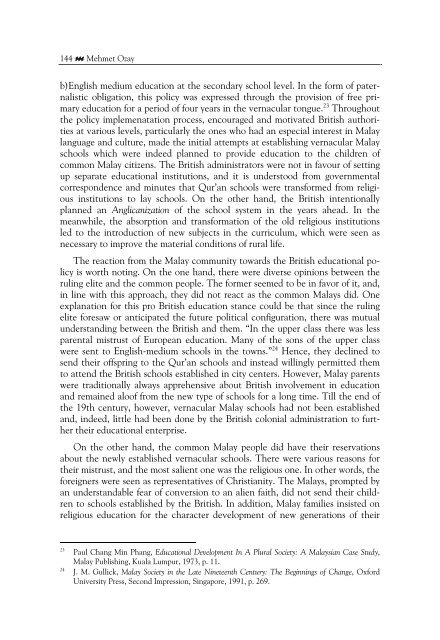İçindekiler - İlahiyat Fakültesi - Marmara Üniversitesi
İçindekiler - İlahiyat Fakültesi - Marmara Üniversitesi
İçindekiler - İlahiyat Fakültesi - Marmara Üniversitesi
You also want an ePaper? Increase the reach of your titles
YUMPU automatically turns print PDFs into web optimized ePapers that Google loves.
144 Mehmet Ozay<br />
b)English medium education at the secondary school level. In the form of paternalistic<br />
obligation, this policy was expressed through the provision of free primary<br />
education for a period of four years in the vernacular tongue. 23 Throughout<br />
the policy implemenatation process, encouraged and motivated British authorities<br />
at various levels, particularly the ones who had an especial interest in Malay<br />
language and culture, made the initial attempts at establishing vernacular Malay<br />
schools which were indeed planned to provide education to the children of<br />
common Malay citizens. The British administrators were not in favour of setting<br />
up separate educational institutions, and it is understood from governmental<br />
correspondence and minutes that Qur’an schools were transformed from religious<br />
institutions to lay schools. On the other hand, the British intentionally<br />
planned an Anglicanization of the school system in the years ahead. In the<br />
meanwhile, the absorption and transformation of the old religious institutions<br />
led to the introduction of new subjects in the curriculum, which were seen as<br />
necessary to improve the material conditions of rural life.<br />
The reaction from the Malay community towards the British educational policy<br />
is worth noting. On the one hand, there were diverse opinions between the<br />
ruling elite and the common people. The former seemed to be in favor of it, and,<br />
in line with this approach, they did not react as the common Malays did. One<br />
explanation for this pro British education stance could be that since the ruling<br />
elite foresaw or anticipated the future political configuration, there was mutual<br />
understanding between the British and them. “In the upper class there was less<br />
parental mistrust of European education. Many of the sons of the upper class<br />
were sent to English-medium schools in the towns.” 24 Hence, they declined to<br />
send their offspring to the Qur’an schools and instead willingly permitted them<br />
to attend the British schools established in city centers. However, Malay parents<br />
were traditionally always apprehensive about British involvement in education<br />
and remained aloof from the new type of schools for a long time. Till the end of<br />
the 19th century, however, vernacular Malay schools had not been established<br />
and, indeed, little had been done by the British colonial administration to further<br />
their educational enterprise.<br />
On the other hand, the common Malay people did have their reservations<br />
about the newly established vernacular schools. There were various reasons for<br />
their mistrust, and the most salient one was the religious one. In other words, the<br />
foreigners were seen as representatives of Christianity. The Malays, prompted by<br />
an understandable fear of conversion to an alien faith, did not send their children<br />
to schools established by the British. In addition, Malay families insisted on<br />
religious education for the character development of new generations of their<br />
23<br />
Paul Chang Min Phang, Educational Development In A Plural Society: A Malaysian Case Study,<br />
Malay Publishing, Kuala Lumpur, 1973, p. 11.<br />
24<br />
J. M. Gullick, Malay Society in the Late Nineteenth Century: The Beginnings of Change, Oxford<br />
University Press, Second Impression, Singapore, 1991, p. 269.



